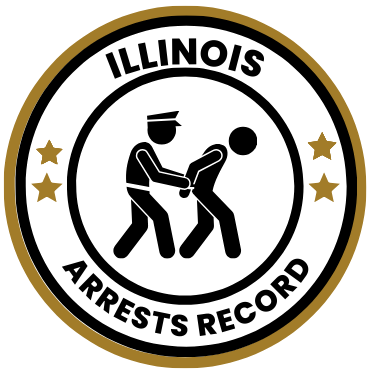ARRESTS.ORG IL – Search Illinois Arrest Records
Welcome to ARRESTS.ORG IL, your go-to source for information on searching Illinois arrest records. Illinois arrest records are typically managed by law enforcement agencies and the state’s Department of Corrections. To obtain these records, individuals often need to contact the relevant authorities directly or utilize official online databases. Our platform aims to guide users through this process, offering tips, resources, and important considerations when seeking Illinois arrest records. Whether you’re conducting personal research or need legal information, ARRESTS.ORG IL is here to support your journey.
SEARCH ILLINOIS ARREST RECORDS
At ARRESTS.ORG IL, we understand the importance of transparency and accessibility when it comes to Illinois arrest records. we’re committed to providing comprehensive information to empower individuals in their search. Illinois arrest records contain vital details such as the individual’s name, mugshot, charges, and arrest location. Understanding how to navigate the process of obtaining these records can be crucial for various purposes, including background checks, legal proceedings, and personal safety. Through our platform, users can gain insights into the procedures, regulations, and resources available for accessing Illinois arrest records. Stay informed and empowered with ARRESTS.ORG IL as your trusted guide in the realm of Illinois arrest records.
Click here to check this: https://illinois.recordspage.org/arrest-criminal-records/
Illinois Arrest Records
Illinois arrest records serve as public documentation providing comprehensive information about an individual’s criminal background. These records, maintained by law enforcement agencies or judicial entities such as the court, fall under the purview of the Illinois Freedom of Information Act [5 ILCS 140]. According to this act, criminal history records, including arrest details, are deemed public information.
In adherence to legal requirements, an arrest record must encompass the following particulars:
- Personal information, encompassing the individual’s name, age, and address.
- A photograph, if available.
- Pertinent details directly related to the arrest.
- Specifics regarding the location and time of the arrest.
- Identification of the law enforcement agency responsible for the arrest or investigation.
- Timestamps for the person’s reception, discharge, or transfer in case of incarceration.
Which Criminal and Arrest Records in Illinois are Accessible to the Public? Which Records Remain Private?
When exploring records in Illinois, it becomes crucial to identify which are categorized as public records and comprehend the constraints on their disclosure. Not all records are open for public scrutiny, and the procedures for public release, as well as the specific records that can be released, are delineated by state law.
According to the Illinois Freedom of Information Act (FOIA), specifically 5 ILCS 140, criminal records in Illinois fall under the classification of public records, available for viewing by the general public. The act furnishes guidelines for the public on accessing records and initiating requests.
Arrest records in Illinois also fall within the purview of the state’s FOIA guidelines, rendering them public records accessible upon request. Moreover, law enforcement agencies have the discretion to disclose specific details about arrests if they choose to do so.
The FOIA law in the state mandates that arrest records should be accessible to the media when an arrest occurs. This information must encompass details such as the individual’s identity (including name, age, description, address, and a photo if available), charges filed, date, time, and location of the arrest, the law enforcement agency responsible for the arrest, and the detention facility where the person is held pending trial.
However, certain criminal or arrest records are not considered public, including juvenile delinquency records, sealed or expunged matters, or those restricted by the courts or state law (such as investigative reports during ongoing cases or information revealing witnesses, victims, or confidential informants). Such records do not appear on daily arrest reports. Additionally, as per 20 ILCS 2635, certified or official background checks for adult criminal history can only disclose convictions, not non-convictions.
Distinguishing between arrest records and criminal histories is vital for hiring managers, landlords, or licensing boards when making decisions regarding candidate applications.
Distinguishing Between Illinois Criminal Records and Arrest Records
In the context of Illinois, arrest records elucidate that an individual was apprehended by law enforcement, detained in a holding facility either until being released on bail or until the trial, and that the person was accused of engaging in a criminal act. These records solely document the initial encounter between the suspect and law enforcement and do not provide information beyond that point.
It is imperative to note that arrest records lack details regarding case dispositions. Consequently, they constitute only a fragment of an individual’s overall criminal history. Due to Illinois law prohibiting the inclusion of non-conviction details in background checks, an arrest may not surface in records until there is a legal resolution concerning the defendant.
Arrest records, though publicly accessible, constitute only a segment of the comprehensive Illinois criminal history. In contrast, Illinois criminal records encompass all the information contained in an arrest record, along with the case’s court proceedings. Notably, if there is a non-conviction, such as a dismissal or acquittal, it will not be reflected in an official criminal history report.
Public criminal records in Illinois exclusively include convictions for misdemeanor or felony offenses. This distinction highlights why relying solely on arrest records for hiring decisions is discouraged for agencies or businesses. State and federal authorities, such as the Equal Employment Opportunity Commission, offer guidance on the appropriate use of criminal history during the onboarding of new staff. While arrest records may disclose the reason for someone’s arrest, they may not reveal the subsequent convictions. Further details about the legal aspects surrounding background checks in Illinois can be explored below.
What is the Arrest Booking Procedure in Illinois?
Upon apprehension, individuals undergo the booking process at the precinct, a procedure that typically takes several hours. The following standard steps outline this process:
- Recording Personal Information and Mugshot Capturing: The suspect’s name and the alleged crime leading to the arrest are initially entered into a computer database. Subsequently, a mugshot of the suspect is taken by the police.
- Handling Personal Belongings: Booking officers confiscate the suspect’s personal belongings, such as accessories and clothing, which are returned upon the suspect’s release from custody. While small personal items like watches may be retained upon request, items considered evidence or contraband remain in police custody.
- Fingerprinting and Checking for Warrants: The suspect’s fingerprints are collected during this phase of the process. This information is entered into a nationwide FBI database, aiding law enforcement in identifying suspects across state lines. The fingerprints are compared, and a search is conducted for outstanding warrants or pending charges, potentially affecting the suspect’s eligibility for release on bail.
- Strip and Full Body Search: Following fingerprinting, a comprehensive body search and pat-down may be conducted as part of the booking process. In certain instances, law enforcement may perform a legal strip search to prevent the introduction of drugs or weapons into the jail facility.
- Health Screening: The police administer a health screening, which may include blood tests for sexually transmitted diseases or X-rays to detect tuberculosis. This precautionary measure aims to safeguard the well-being of jail officials and other inmates. Additionally, the police may request a DNA sample.
- Interrogation with Miranda Exception: If there is suspicion of the inmate’s affiliation with gangs, a police officer may conduct an interrogation. Depending on the response, the inmate may be relocated to a different section of the jail or placed in protective custody.
Reasons Behind Recent Arrests and Determine Inmate Status in Illinois: Explore This Complimentary Search
When an individual is apprehended, there arises a natural curiosity about the reasons for their arrest. People may seek to understand the circumstances of someone’s arrest, inquire about the incarceration of an acquaintance, or simply wish to stay informed about the current jail population in their vicinity and the associated legal reasons.
Conducting an inmate search not only reveals the current status of an individual but also provides insights into the charges they are facing. Initiating a search for arrest records is recommended to commence with the local sheriff’s office, typically responsible for overseeing the county jail.
Even in cases where the county agency did not carry out the arrest, it is advisable to begin the inmate search process with the county sheriff’s department, rather than the local police department. To facilitate the searcher, a table is presented below, detailing county sheriff’s offices, associated webpage links (when available), and information regarding the presence of an inmate search tool and mugshot display on the respective pages.
Unveiling Arrest Status: Locate Someone Now!
- Open a search engine on your computer, such as Google or Bing.
- Enter the search query “Illinois [city or county of arrest] jail search.”
- Examine the search results for the official agency website, which typically ends in .gov or .us. Note that local law enforcement sites may have alternative URL endings like .org, .net, or .com.
- Click on the link leading to the official website and look for options such as “inmate search,” “inmate lookup,” or “inmate roster.”
- Follow the instructions on the website to access the inmate listing. This may involve entering the first and last name for a name search or reviewing the full roster.
- If there is no apparent link for searching or viewing detainees, contact the non-emergency number provided on the website to make an inquiry.
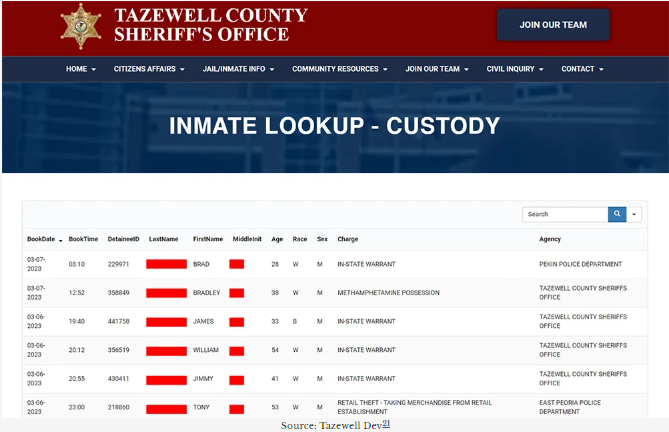
To illustrate, suppose an individual wishes to locate individuals held at the Tazewell County Sheriff’s Office. They can follow these steps:
- Conduct a Google search for “Illinois Tazewell County jail search.”
- Among the search results, identify and click on the link leading to the inmate lookup page of the Tazewell County Sheriff’s Office.
- Examine the inmate roster to check if the person being sought is listed.
While county sheriff’s offices are not the sole entities responsible for making arrests, they typically handle the housing of inmates, even those apprehended by city police. Further information is provided below on how to find individuals detained by city law enforcement.
Discovering Recent Arrests in Illinois City Jails
When exploring arrest records, the initial point of reference is typically the county lockup. However, it’s worth noting that in some instances, city law enforcement may either disclose recent arrest records or operate a city jail. This trend is more prevalent in larger metropolitan areas characterized by increased populations and elevated crime rates.
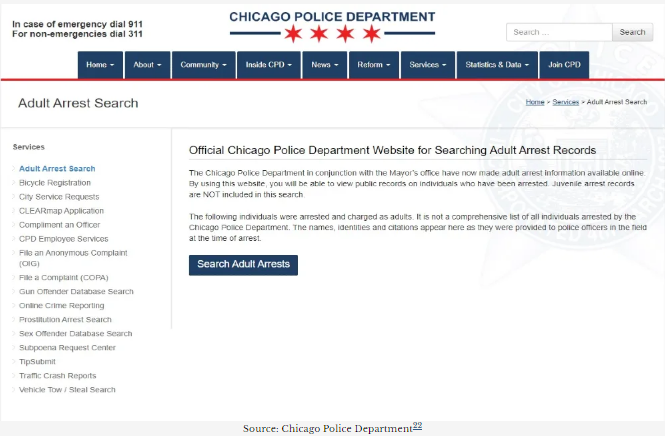
For instance, individuals can utilize the online platform maintained by the Chicago Police Department to inquire about recent arrests. The available information encompasses details such as the individual’s name, the location and time of the arrest, bond details, charges filed, and a corresponding mugshot.
The portal also features a section disclosing the release date or the current housing status of the individual if they haven’t posted bail or undergone a hearing. This arrest record serves as a resource to understand the reasons behind someone’s detention by the Chicago PD.
In contrast, the Aurora Police Department does not publicly list current arrests online. To obtain information about where an individual has been taken following an arrest by the Aurora PD, one must contact the police department’s non-emergency line at 630-256-5000 or explore the jail facilities in any of the four counties covered by Aurora: DuPage, Kane, Kendall, or Will Counties.
Joliet, the third-largest city in Illinois, similarly does not release a roster of arrestees by the Joliet Police Department online. Consequently, individuals seeking such information would have to check the county lockup in Will County to determine if a Joliet PD arrestee is currently housed in that facility.
Is it possible to conduct a comprehensive search for public arrest records across the entire state of Illinois?
Although there isn’t a centralized statewide arrest records database, individuals can utilize the Illinois Court search engine to examine all court filings. By reviewing these filings, one can determine if an arrest warrant has been issued in a particular case. This process involves clicking on each individual case filing to access and assess the relevant details, which may require a significant amount of time.
Access to the online database mandates registration for obtaining court records. However, it’s important to note that users are only charged when requesting official copies and not on a per-search basis.
The court search portal serves as a viable method for accessing criminal records in the state, given that the courts serve as the authoritative compilers of comprehensive criminal records. Further details on searching these records are elaborated below. Many individuals seek information on someone’s incarceration status to understand the procedures for release or establish contact with the person in question.
How to Reach an Incarcerated Individual and Secure Their Release in Illinois
Discovering the location of an individual’s housing is crucial when attempting to establish contact with an inmate and obtaining information about their bond for potential bail. By employing the search guidelines and reference table provided for city and county law enforcement agencies, one can ascertain the inmate’s whereabouts. Additionally, details regarding visitation, contact procedures, and bond-related information can be gleaned from the agency’s website or by contacting the non-emergency number specified in the table or on the agency’s homepage.
It is noteworthy that each jail has the autonomy to establish its own visitation schedules and determine the mode of visitation, whether in person or through video. Therefore, it is imperative to thoroughly review all the pertinent information on visitation and contact available on the department’s website. In the absence of a functional website, individuals can acquire information by reaching out to the non-emergency number provided to inquire further about visitation and contact procedures.
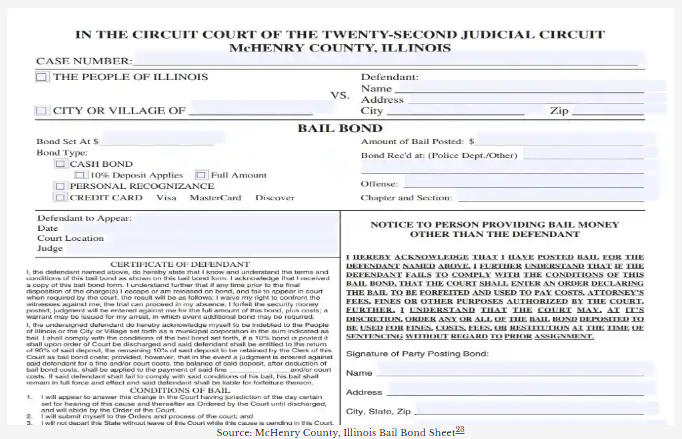
For instance, the Lake County Sheriff’s Office exclusively accepts cash or cashier’s checks for bail payments, according to information provided on their official website. The website advises family and friends seeking to post bond to complete a specific bail bond form from the circuit court for amounts below $10,000, while a bond information form is required for bonds exceeding $10,000, as detailed on the agency’s website.
Utilizing the aforementioned table of county sheriff’s offices, individuals can contact the desired facility either through the website or the non-emergency contact number to obtain information on reaching inmates or facilitating bail procedures.
It’s important to note that arrest records in Illinois constitute only a segment of an individual’s comprehensive criminal history. These records mark the initial stage in the development of an individual’s court or criminal record. The subsequent section provides additional insights into utilizing court records to construct a more thorough understanding of someone’s criminal history.
Discover the Process of Accessing Illinois Criminal Records (Explore IL Criminal Records)
The governmental division known as the Illinois Courts oversees the reception of all criminal complaints submitted within the respective circuit or jurisdiction where the arrest or charge originated. This division is tasked with scheduling hearings and maintaining a comprehensive record of proceedings for each case within that circuit. In every county, a circuit clerk of court is appointed to oversee the court staff in that particular region.
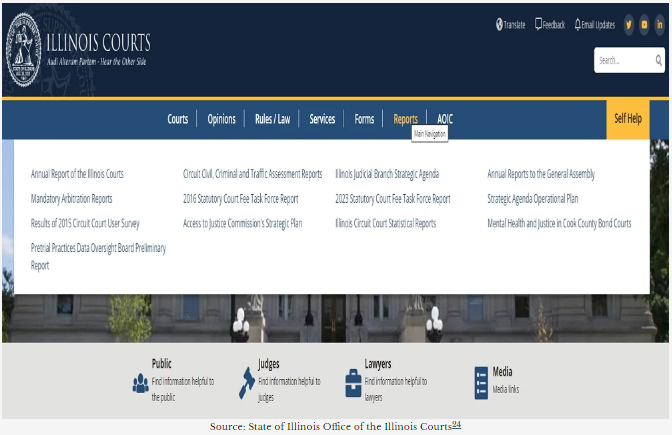
Individuals who are either victims, witnesses, or members of the public are often curious about the legal proceedings when someone they know or someone residing in their vicinity faces criminal charges. To access Illinois criminal records through the court system, follow these steps:
- Navigate to the Illinois Courts page.
- Hover over the services tab to reveal the drop-down menu.
- Select the link for the online state court record repository named re:SearchIL. Note that this is a .net site, not a .gov site, but it serves as the official state public records repository for court records.
- Users are required to register to gain access to the website. Registration is free and can be completed either as the defendant checking their own record or as a member of the general public seeking information in their locality.
- Log in to the registered account.
- Click the advanced search button on the webpage.
- In the first search category section, choose “party” from the drop-down menu to conduct a name-based search.
- Enter the first and last name of the person and initiate the search.
- A list of all cases associated with the specified party’s name will be displayed. Clicking on the name at the top of each box will provide detailed information about the case.
While this method provides statewide information, there may be instances where searchers specifically require data from their local jurisdiction or courthouse. In such cases, it is recommended to visit the court directly and utilize a public terminal at the clerk’s office.
Discover the Process for Obtaining Criminal Records in Illinois
The Illinois State Police serves as the authorized source for certified background checks related to employment or housing within the state. To gain access to records online, agencies or businesses are required to enroll with the state’s Division of Innovation and Technology and obtain a digital ID.
To secure a copy of an individual’s criminal record through the Illinois State Police, follow these steps:
- Visit the Illinois State Police (ISP) website.
- Access the official online request portal, CHIRP (Criminal History Information Response Process), by clicking the relevant link.
- Complete the registration process for a digital ID via the state’s platform. Once the digital ID is granted, individuals can proceed to request Illinois criminal records online.
- Log in to the account after successful registration and perform a name-based search to retrieve the desired Illinois criminal records.
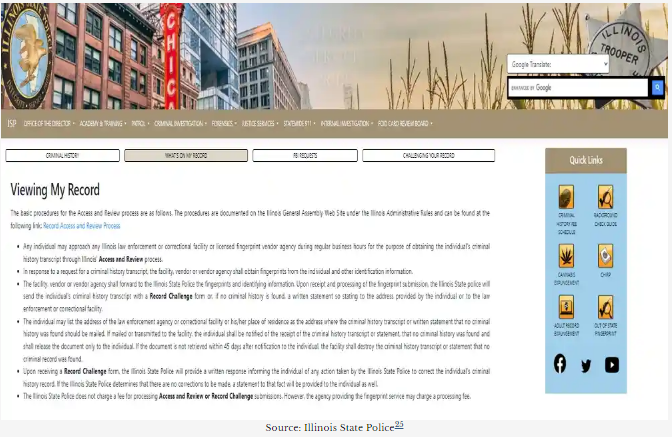
The ISP encourages the submission of background check requests through CHIRP or the online Uniform Conviction Information Form. An official background check incurs a nominal fee per record.
Before initiating the background check, the individual under scrutiny must be notified and provide consent to the ISP for accessing their historical information.
If individuals desire to review their own criminal record in Illinois, they can request a copy from any local state police department, correctional facility, or licensed vendor capable of taking their fingerprints for record processing.
Checking for a person’s criminal record is essential for informed decisions related to housing, employment, or personal matters. Examining an individual’s criminal record can reveal whether they have been convicted of misdemeanors or felonies in the state, leading to imprisonment or probation (either supervised or unsupervised). Further details on probation and parole can be found below.
Identifying Probation or Parole Status in Illinois
Probation and parole entail court-mandated monitoring within the community instead of confinement in a prison setting.
To provide insight, the accompanying visual representation illustrates the overall count of individuals under probation or parole in Illinois, drawing comparisons with other states nationwide. Moreover, it highlights the ethnic composition of individuals under community supervision in Illinois, encompassing both probation and parole cases.
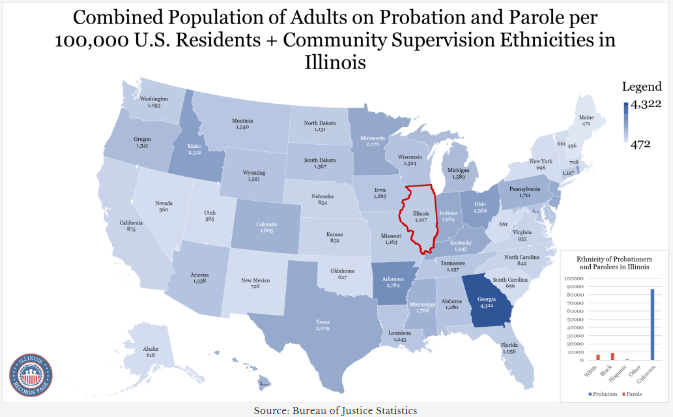
To identify individuals under probation in Illinois, follow these instructions:
- Access the website of the Probation Services Division of Illinois Courts.
- It’s important to observe that there isn’t a dedicated online link for probationer searches on the website. To ascertain the probation status of an individual, one must conduct a search within the Illinois Court System Services statewide records repository link, which necessitates registration.
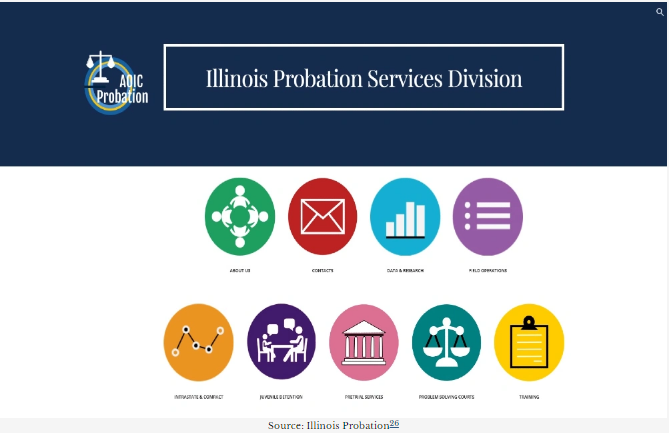
Illinois Parolee Database: Quick Steps to Access and Review Records
To access the parolee database in Illinois, follow these steps:
- Navigate to the search portal on the Illinois Department of Corrections (IDOC) website, located at the top of the page.
- Select the option to conduct a search based on the last name by clicking the corresponding circle.
- Enter the last name of the individual in question and click the “find” button.
- Examine the list of search results to locate the subject’s record. Click on the specific record to view detailed information.
- In the section displaying the offender’s status, check for parole status. Further down, you will find the date of the person’s release from prison on parole, along with the date they will be released from community supervision.
- Parole records additionally provide details on the person’s previous incarceration location, the charges leading to their prison sentence, and a physical description, including a mugshot.
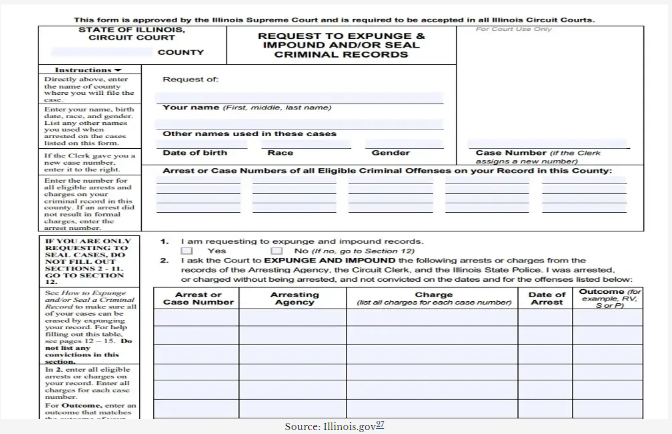
While parole entails premature liberation from incarceration, it does not inherently erase from an individual’s record merely due to their release before completing the full sentence. Identifying whether someone is incarcerated cannot be determined through these records. Instances that remain unsealed or unexpunged will persist on the record, as elaborated in the following discussion.
The Process of Sealing or Expunging a Criminal Record in Illinois
The act of sealing or expunging a criminal record involves removing it from public visibility, ensuring its exclusion from any future criminal background checks. The steps to seal or expunge a record in Illinois are outlined as follows:
- Begin by conducting an online search using a search engine such as Google.
- Enter the query “steps to seal or expunge cases in Illinois” in the search bar.
- Locate the official website of the state agency responsible for handling sealing and expunging cases; in this case, it is the Illinois Office of the State Appellate Defender website.
- On the website, identify the appropriate expungement form, such as juvenile, adult, or cannabis forms, and click on the respective link.
- Access detailed instructions on how to fill out and submit the chosen form(s). Download and complete the necessary form(s).
- Submit the completed forms to the circuit court where the charges were entered in person at the courthouse or electronically through the Illinois Courts website.
- The circuit clerk will notify the district attorney, city or town counsel/attorney, the arresting agency, and the Illinois State Police about the expungement petition, allowing them the opportunity to raise objections.
- If there are no objections, the court may approve the expungement without the need for a hearing. However, if objections are raised, a hearing will be scheduled.
- The court will render a final decision on the petition, and if expungement is granted, relevant agencies will be informed, and the record will be handled according to the court’s order.
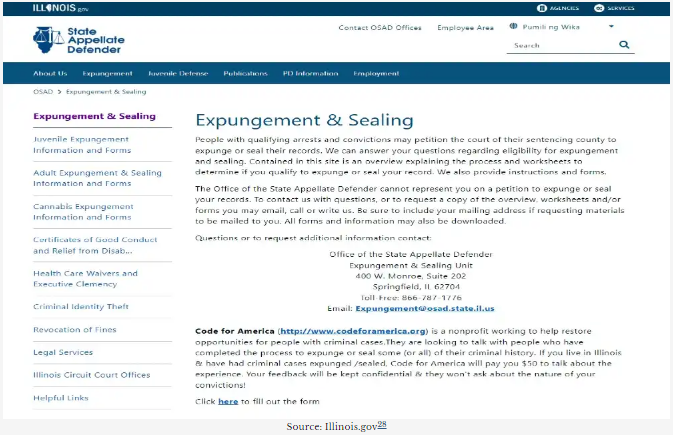
The eligibility for sealing or expunging cases in Illinois hinges on whether the offense satisfies the prescribed criteria. The following scenarios qualify for expungement:
- Individuals who were arrested and subsequently released without formal charges being filed,
- Cases that have been dismissed,
- Instances where the defendant was acquitted,
- Cases in which the courts determine there is no probable cause to proceed,
- Convictions with reversed or vacated dispositions,
- Most misdemeanor or felony convictions.13
However, certain convictions do not qualify for expungement or sealing, including:
- DUI (Driving Under the Influence),
- Reckless driving by a driver aged 25 or older at the time of the offense,
- Traffic infractions or minor offenses,
- Domestic battery,
- Battery of an unborn child,
- Violation of a protective order,
- Any sex offenses or offenses requiring sex offender registry,
- Charges related to public indecency,
- Convictions related to dog fighting,
- Animal neglect.13
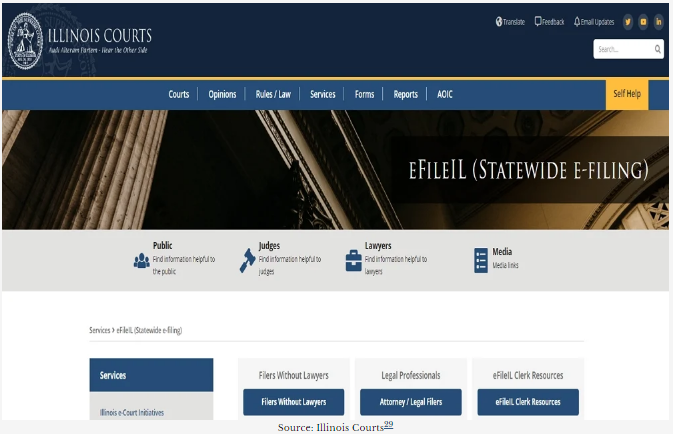
Clearing or erasing a record enhances the individual’s prospects for obtaining employment or housing, particularly in situations where a criminal record might have posed a hindrance. Regardless of whether the individual has undergone a period of incarceration, meeting all stipulated conditions allows them to request the court to seal or expunge the record. The process of determining whether someone is currently incarcerated in Illinois is elucidated below.
Discovering the Incarcerated Population in Illinois & Federal Convicts
Residents of Illinois may have an interest in identifying individuals currently serving prison sentences within their state or may seek information regarding the incarceration status of someone involved in legal proceedings, such as a witness or a perpetrator of a crime against them. In Illinois, there are a total of five federal prisons and 43 state correctional facilities. To inquire about federal inmates in Illinois, follow these steps:
- Access the search portal provided by the Federal Bureau of Prisons (BOP).
- Input the individual’s name into the search fields. If available, additional details such as race, gender, and age can also be provided.
- Initiate the search by clicking the corresponding button at the bottom.
- Examine the search results to locate records matching the specified individual. If the person is currently under federal custody, the search results will indicate the facility’s location under the “Located At” section.

A small fraction of the total prisoner population in Illinois consists of federal inmates. The majority of individuals in custody are those who have been convicted of violating state laws, and they are placed in correctional facilities maintained by the state.
To locate information about an inmate in a state correctional facility, follow these steps:
- Visit the Illinois Department of Corrections website.
- Hover the mouse over the section labeled “Individuals in Custody” and select the “Individual in Custody” link from the drop-down menu.
- Choose the option to search by last name by checking the corresponding circle.
- Input the last name of the individual in the search box and click the “Find” button.
- Review the list of search results to locate records matching the search subject.
- Select the records to be reviewed and click the button labeled “Query a Highlighted Inmate” at the bottom to view details.
- The details will include a mugshot of the inmate, a physical description, convictions, the inmate’s current location, projected parole date, projected release date, and the total duration of the imposed sentence.
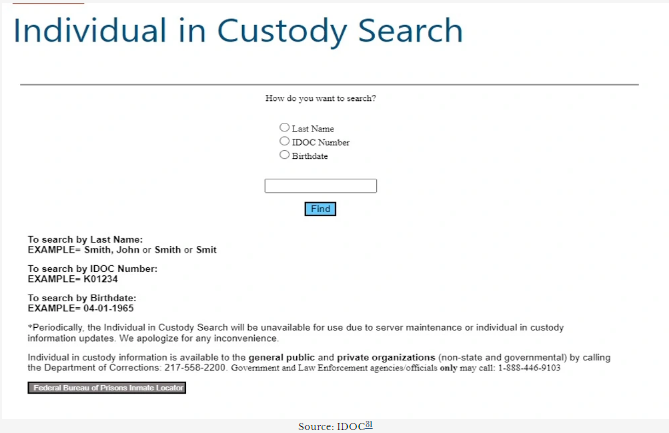
Typically, imprisonment marks the final phase of an individual’s legal punishment, unless they are granted parole. Upon completing their sentence, individuals are no longer subjected to any specific conditions, unless they are obligated to register as a sex offender, a topic that will be explored later in this article.
Legal cases generally commence with the issuance of a warrant, a matter that will be elaborated on in the subsequent discussion.
Conduct an Illinois Warrant Inquiry to Determine the Existence of an Arrest Warrant for You or Another Individual
Individuals are often eager to ascertain whether there is an active warrant for their arrest or for someone they know. While warrants are generally considered public records in the state of Illinois, there isn’t a centralized statewide database specifically dedicated to warrants.
To find information about warrants, individuals must contact the local law enforcement agency in the area where they reside or work. Some law enforcement agencies publish online lists of active warrants and encourage those individuals with warrants to surrender themselves to resolve the issue. To initiate a search for warrants in a particular locality, follow these steps:
The process and guidelines outlined above for locating an inmate can also be applied to discovering information about posting bail or arranging visitation/contact with an inmate at the facility where the person is being held. Some agencies may publish a most wanted list, a warrant roster, or may not provide warrant data on their webpage.
For instance, individuals in Lake County seeking information about potential criminal charges can use the following query: “How do I check if I have a warrant in Lake County, Illinois?” In this case, the official source would be the Lake County Sheriff’s Office website. By accessing this website, individuals can examine a PDF document containing details of all active warrants in that county.
The warrant list typically includes the individual’s name, last known address, age, sex, race, date of birth, height, weight, hair and eye color, along with the issuance date of the warrant.
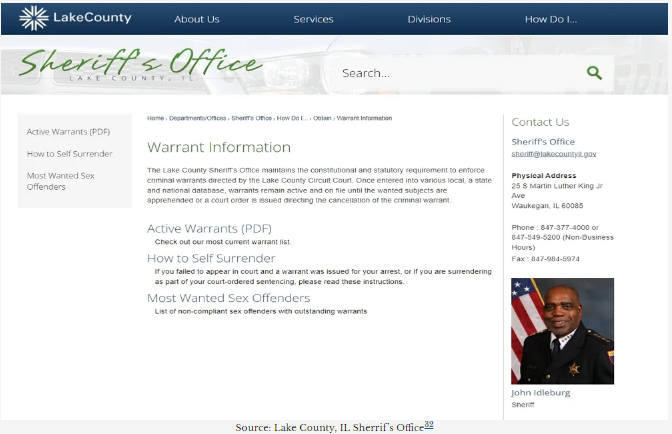
The agency website of the Chicago Police Department also displays an inventory of currently active warrants. Beyond the details provided in the Lake County list, Chicago PD furnishes additional information such as the alleged crime committed by the individual and a photograph of the presumed offender. However, a perusal of CPD’s website reveals that numerous warrant lists have not undergone updates for several years.
Individuals who suspect the existence of a warrant for their arrest have the option to enlist the services of an attorney for assistance in confirming the issuance of a warrant. The attorney can also aid in facilitating the person’s surrender to law enforcement, expediting the issuance of bail, and concurrently working on the individual’s defense in court.
The visibility of warrants on a background check varies, contingent on the type of screening being conducted and the entity carrying out the screening.
Exploring the Illinois Sex Offender Registry to Identify Nearby Sexual Offenders
In light of the nature of the offense, individuals who have been convicted of a sexual offense are mandated to register with the local sheriff’s office in the county of their residence. Citizens have the privilege to consult this registry to identify individuals in their vicinity who have been convicted of a sexual offense, thereby enhancing public safety and awareness.
The motives for consulting the registry may vary from mere curiosity to essential information needed for employment, licensure, or housing applications. An individual with a sexual offense may face housing denial if it would result in a violation of the registry, or employment denial if the conviction poses a threat to public safety or vulnerable populations.
To initiate a registry search, follow these steps:
- Access the Illinois State Police website.
- Navigate to the link for the sex offender registry.
- Read and acknowledge the disclaimer by clicking the agree button.
- Enter the first and last name of the subject and click the find button.
- Examine the list of search results to identify the record corresponding to the subject.
The information available in the registry encompasses details such as the offender’s name, aliases, address, mugshot, physical description, crimes convicted of, county of conviction, and compliance status with the registry requirements.
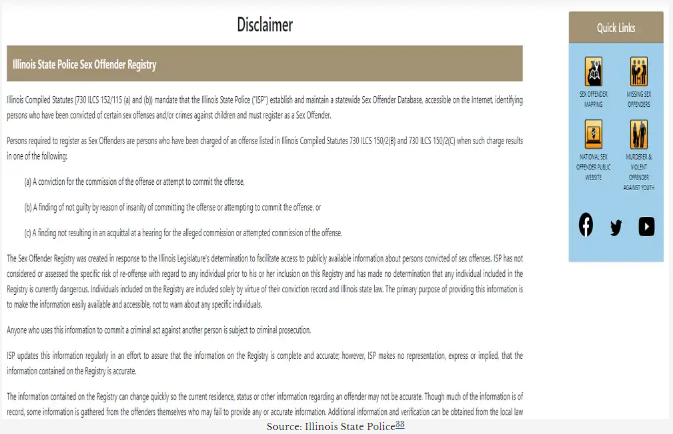
The application of sex offender registry information for housing or employment is governed by the same legal regulations as other criminal history data. However, it is imperative to adhere to both state and federal statutes.
Overview of Laws Regarding Criminal Records and Arrest Records in Illinois
The utilization of Illinois criminal records is fundamentally governed by both state and federal laws, which dictate the permissible extent of information disclosure and its application.
In 2021, Illinois enacted the Employment Background Fairness Act (HB 3056), rendering it illegal to reject employment solely based on a previous criminal conviction. Employers must evaluate the conviction’s direct impact on the individual’s ability to perform the job. For instance, while a person convicted of child abuse may be disqualified from working in a childcare center, automatic denial of employment in a fast-food restaurant based solely on past convictions is prohibited under this statute.
This legislation aligns with guidelines set by the Equal Employment Opportunity Commission (EEOC) concerning the use of criminal or arrest records in hiring decisions. The EEOC enforces anti-discrimination laws locally, addressing unjust background check practices. The state law complements existing federal laws.
The Uniform Conviction Information Act of 1991 (20 ILCS 2635) designates the Illinois State Police as the official repository for criminal records. It restricts the release of records to conviction information within the state and necessitates FBI involvement for nationwide screenings.
The UCIA mandates agencies to retain files for two years, including the subject’s consent to a background screening. Subjects must be provided with a copy of the screening report, with a seven-day window to notify the Illinois State Police of any inaccuracies. Additionally, the UCIA establishes fees for background check services.
Background screenings for specific positions, such as those involving children or vulnerable adults, adhere to the Adam Walsh Child Protection and Safety Act and the National Child Protection Act. These laws specify certain offenses as automatic disqualifiers for roles involving vulnerable individuals.
Illinois also implements the Job Opportunities for Qualified Applicants Act, commonly known as the state’s “ban the box” law, preventing employers from inquiring about an individual’s criminal history until after an initial determination of job qualifications has been made.
Finally, the Fair Credit Reporting Act limits the review of most positions to the past seven years and applies to non-convictions. This Act provides an additional layer of protection against non-convictions appearing on an Illinois background check, encompassing commercial people finder sites and government agencies.
All the aforementioned laws also extend their jurisdiction to arrest records in Illinois, delineating what information can be made public and outlining the obligations of agencies when responding to record requests.
This guide serves as a resource for individuals conducting background checks, offering insights into finding arrest records in Illinois and providing guidance on checking criminal records for informed decision-making in hiring, licensure, or housing applications.
Frequently Asked Questions
Find brief answers to common questions in our Frequently Asked Questions (FAQ) section on arrests-il.org. From understanding the arrest process in Illinois to navigating our website efficiently, locate the information you require for a smooth user experience.
How can I obtain a copy of my own Illinois arrest record?
Obtaining a copy of your own Illinois arrest record involves submitting a request to the Illinois State Police through their Bureau of Identification, either online or by mail. You’ll need to provide personal information, fingerprints, and a fee for processing. It’s crucial to ensure the accuracy of the information before applying.
Are Illinois arrest records public information?
Yes, Illinois arrest records are generally public information, accessible to anyone upon request. However, sensitive details, such as juvenile records or expunged information, may be restricted. The Illinois Freedom of Information Act grants the public the right to access these records for transparency.
What information is included in an Illinois arrest record?
An Illinois arrest record typically includes personal details, charges, mugshots, fingerprints, court disposition, and any other relevant information related to an individual’s interaction with law enforcement. This comprehensive information is compiled to maintain an accurate account of a person’s criminal history.
How can I expunge my Illinois arrest record?
Can employers access my Illinois arrest records during a background check?
In Illinois, employers are generally prohibited from considering arrest records when making hiring decisions. However, they may inquire about convictions. Certain industries or positions may have specific regulations regarding background checks, so it’s essential to be aware of the relevant laws and consult legal advice if needed.
